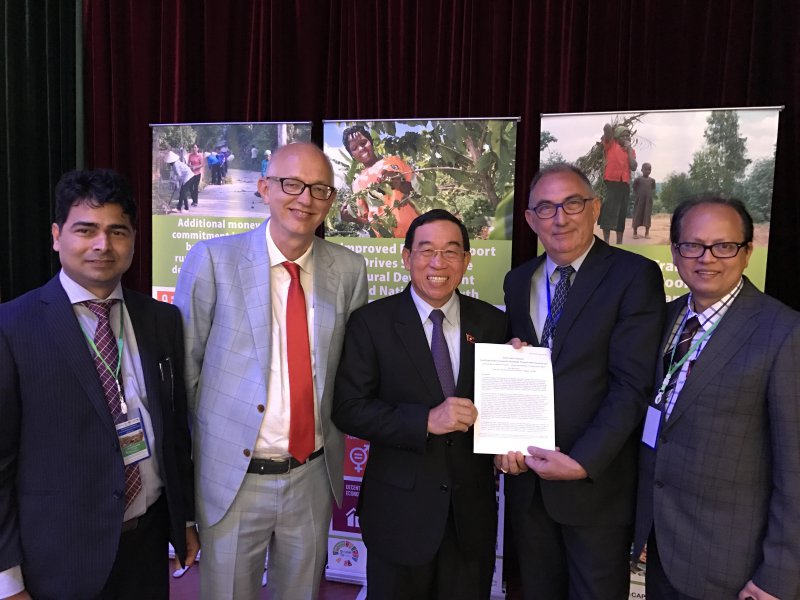Vientiane Declaration on Sustainable Rural Transport towards Achieving the 2030 Agenda for Sustainable Development adopted at 10th EST Forum
17 Mar, 2017
Vientiane, Lao PDR

Adoption of the Vientiane Declaration (from left to right): Mr. Ganesh Raj Joshi (UNCRD), Mr. Cornie Huizenga (SLoCaT Partnership), H.E. Dr. Bounchanh Sinthavong (MPWT Lao PDR), Mr. Peter O’Neil, and Mr. Choudhury Rudra Charan Mohanty.
The Vientiane Declaration on Sustainable Rural Transport towards Achieving the 2030 Agenda for Sustainable Development has been adopted by representatives of member countries of the Regional Environmentally Sustainable Transport (EST) Forum in Asia,[i] observer countries,[ii] international organizations, bilateral and multilateral agencies, civil society organizations, the scientific and academic community, the private sector, sustainable transport professionals, and other stakeholders during the Intergovernmental Tenth Regional EST Forum in Asia on March 16, 2017 in Vientiane, Lao PDR. The Declaration demonstrates the collective commitment of the government authorities, development agencies, civil society, the academia, the private sector, and other relevant stakeholders in the EST region to promote inclusive, affordable, accessible and sustainable rural transport infrastructure and services, in order to facilitate improved access to basic utilities and services including health and education by the rural poor and vulnerable groups.
Background
The 2030 Agenda for Sustainable Development, with 17 Sustainable Development Goals (SDGs) and 169 related targets at its core, represents a plan of action for people, planet and prosperity, and reflects national commitments to put the world on a more sustainable and resilient path. Through the adoption of the Vientiane Declaration, , EST member states have acknowledged the vital role of sustainable rural transport in achieving the SDGs. Essential steps realizing the SDGs for the rural sector include developing and maintaining rural transport infrastructure (e.g. footpaths, tracks, trails, farm and feeder roads, railroads, waterways, bridges and drainage systems), expanding rural transport service networks to promote education and health in isolated areas, and improving rural transport access to provide enabling environments for trade and commerce.
Improved rural transport infrastructure and services are a key enabler to increased rural resiliency, rural empowerment and rural socio-economic transformation through poverty eradication, hunger elimination, social integration, increased food security and improved supply chain logistics. In addition, climate adaptive and disaster resilient transport investments in rural areas can help secure all-season access to markets and essential services and prevent isolation of fragile or remote communities, thus contributing to economic development and well-being.
Commitment under the Vientiane Declaration
By adopting the Vientiane Declaration, stakeholders from the transport ministries and other relevant stakeholders in the EST region have committed to:
- Promote inclusive, affordable, accessible and sustainable rural transport infrastructure and services, in order to facilitate improved access to basic utilities and services including health and education by the rural poor and vulnerable groups;
- Explore climate adaptive road and infrastructure investments in rural areas to enhance resilience of local communities as well as to secure all-season access to essential utilities and services;
- Promote environmentally sustainable transport in rural areas by introducing low-carbon transport system and avoiding road development without environmental consideration;
- Promote efficient rural access, rural-urban connectivity and sustainable freight movement with an objective to achieve rural livelihood security, rural resilience, rural empowerment and productivity , and sustainable rural and regional development in support of successful implementation of the SDGs;
- Assign due priority to rural transport projects and initiate the development of national strategies and policy frameworks to improve rural transport connectivity to wider local, national and regional transport networks
- Improve transport safety, sustainability and efficiency in rural areas through better coordination of relevant stakeholders, legal framework s , and enforcement of safety and environmental regulations, including mandatory vehicle inspection and maintenance (I/M), driver and mechanic training, monitoring of fuel quality against adulteration, and inclusive planning and management techniques;
- Utilize the outputs of research for innovative methodologies to provide more sustainable and appropriately-engineered rural connectivity that provides value-for-money and incorporates local resources and materials;
- Stronger national, regional, and international cooperation on capacity building and technology transfer on innovative solutions for rural transport.
Although agriculture is a key economic sector and rural transport is a key developmental issue for most Asian countries, currently there is no dedicated goals under the Bangkok Declaration for 2020 to address these issues. The Vientiane Declaration is a milestone of the EST regional process to recognize the role of rural transport in achieving sustainable development and identify concrete actions for the public and private sector, international organizations, bilateral and multi-lateral agencies, non-Government organizations, and the science and academic community to promote sustainable rural transport infrastructure and services.
As the Bangkok Declaration is coming to a close in 2020 and a follow-up agreement is expected to be developed in the upcoming EST forums, it is suggested that a dedicated goal on rural transport must be developed and the measures and actions for rural transport development identified in the Vientiane Declaration should be considered and incorporated in the new agreement. By having a direct goal on rural transport infrastructure and services, the renewed agreement of EST countries for the post-2020 period will be on the right track to achieve a number of SDGs under the 2030 Agenda, in particularly the SDG indicator 9.1.1., “Proportion of the rural population who live within 2 km of an all – season road.”
Please see full declaration here.
[i] Member countries of the EST Forum in Asia: Afghanistan, Bangladesh, Bhutan, Cambodia, India, Indonesia, Islamic Republic of Iran, Japan, Lao PDR, Malaysia, Maldives, Mongolia, Myanmar, Nepal, Pakistan, the Philippines, Russian Federation, Republic of Korea, Singapore, Sri Lanka, Thailand, Timor-Leste, and Viet Nam
[ii] Observer countries of the EST Forum in Asia: Azerbaijan, Ecuador, Kiribati, Kyrgyzstan, Malawi, Peru, Seychelles, Solomon Islands, Tajikistan, Turkmenistan, Uganda, Uzbekistan, Vanuatu, Zimbabwe